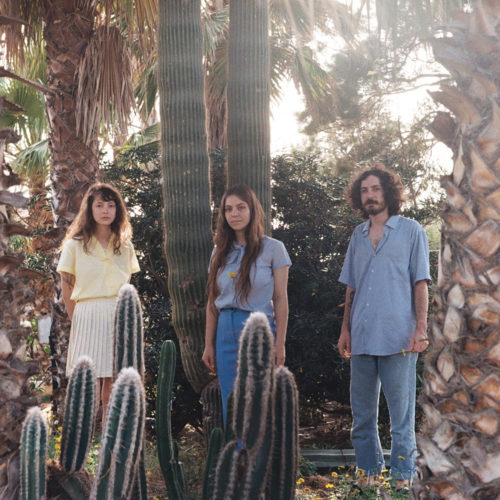
Dmaot
—
Out May 03, 2024
—
Batov Records



Sun, sea, and surf rock converge with dreamy hypnagogic pop on ‘Dmaot,’ the enchanting sophomore album by the guitar-wielding, vocal-harmonising trio, Rasco.
Named after Charlie Megira’s acclaimed track “At the Rasco” and influenced by iconic artists like The Cramps, Beach Boys, Elvis, April March, and others, Rasco carefully extracts the essence and distinctive sound of sixties surf and garage bands and distils them into a modern and distinctly Mediterranean context. Blending ethereal vocal harmonies with irresistible guitar riffs, Rasco skillfully creates a one-of-a-kind sonic blueprint that sounds like something you dreamed of hearing at Twin Peaks infamous Roadhouse.
Electric guitarist Eden Atiya and bass guitar Gaya Wajsman first crossed paths in a smoky cave in Jerusalem, eventually teaming up with drummer Itay Hamudi to form Rasco. Their self-titled debut album, characterised by catchy guitar riffs entwined with mysterious, ethereal vocals, sung in Hebrew, garnered attention and playlistings from the likes of acclaimed pianist, singer, and composer Hania Rani, and Spotify’s editorial team.
Rasco’s hypnotic guitar and vocal-heavy sound have earned the group coveted opportunities to share the spotlight on stage alongside global psych bands such as Altin Gun, Boom Pam, and Messer Chups. The trio’s musical journey has taken them on tour in Germany and led to their billing on Cologne’s famed c/o pop Festival, solidifying their place in the contemporary psych and surf rock scene.
‘Dmaot’ (Tears) represents a significant evolution from Rasco’s debut, showcasing a darker, and denser side with a shift towards the shoegazing sounds of the ’80s. The album, produced by multi-instrumentalist Uri Brauner Kinrot, leader of Boom Pam, pioneers of today’s resurgence in Middle Eastern surf rock and now labelmates on Batov Records, packs a heavier punch while maintaining Rasco’s signature hypnotising power.
The album delves into dreamlike landscapes, capturing the essence of different scenarios. “Layla” conjures hazy night-drives into the mountains, whilst “Nahar/Rau” reflects prophecies in rivers, birds, and sand. “Suzi Suzuki” is an ode to Japan, and “Louisa” pays homage to Hamudi’s Grandma. According to Eden, there’s a prevalent theme of “nostalgia for something you’ve never experienced.” Similarly, “Sleeping Sea”, hints at the omnipresent power of the sea, even at its stillest, with its brooding hammond chords and almost C&W guitar, paints memories of Chris Isaak’s “Wicked Games”.
‘Dmaot’ also explores the dichotomy between life in the city and life in the countryside. Eden notes, “It’s definitely something to define our songwriting by – the mix between electric heavier sounds and mystical, nature-inspired lyrics”.
Commencing with a chime-like guitar motif before the first heavy wave of shoegaze-like tremolo hits, “Layla” alternates with an almost Lynchian pre-chorus, whilst the song earworms its way to your brain. “Nahur Rau” almost screams “garage rock anthem” with it’s clap-accompanied beat group rhythm, and fuzz guitar riffs, but the energetic delivery is balanced by Rasco’s laidback style. It would be remiss to omit mention of the group’s incredible cover of Tears For Fears’ “Head Over Heels”, that seamlessly connects The Smiths, Julee Cruise and the B-52s, in the group’s own haunting style.
Rasco is a genre-defying trio that transcends the boundaries of surf rock and psych, creating a mesmerising blend of sound and emotion. ‘Dmaot’ is a testament to their evolution as artists and their ability to weave a tapestry of sonic landscapes into their own world.